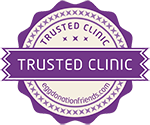
The Egg donation success rates are usually very high, the possibility of getting pregnant on the first attempt is an average of 60% and it can reach up to 90% in the following cycles.
Egg donation or IVF with egg donor is a kind of fertility treatment that allows many women who cannot get pregnant with their own eggs to have a baby. Thus, the future mother will receive and carry an embryo from an egg donor and the sperm from her partner or male donor. Egg donation is indicated for all those women who suffer from premature menopause, women over 40 years old, young girls affected by ovarian failure, women who do not have eggs or have poor quality eggs due to endometriosis or cancer. It is also recommended for those women who could not achieve the pregnancy through an IVF with their own eggs. Once the donor’s eggs are produced, they are fertilized with their partner or donor sperm in the laboratory. After that process, embryos with the best quality are transferred to the patient’s uterus. Therefore, the Egg donation success rates are higher than an IVF with their own eggs.
Particularly, high success rates for Egg donation are due to the main requirements which the egg donors need to meet are:
- Age
- Physical and immunological situation
- Quality of eggs
The age of donors may range from 18 to 30 years old. This is a key factor to achieve the pregnancy since as age increases, the quality and number of eggs decrease considerably.
The donor must be free of genetic, congenital or hereditary diseases. For this reason, she is subjected to several medical screenings to test her physical and mental health condition such as:
- Blood tests to check liver, renal and coagulation function
- Serology study to rule out sexually transmitted diseases
- Ultrasound scan
- Genetic study: Karyotype and cystic fibrosis tests to dismiss possible hereditary disease
- Personal interview with psychologists specialized in assisted reproduction
Furthermore, the woman is subjected to a fertility study by the team specialized in assisted reproduction in order to demonstrate her ability to produce quality eggs. These oocytes are studied to select the most suitable eggs to be used for the fertilization process.
In addition to the high percentage offered by Egg donation, there are other advantages for the patient, for instance a lower risk of miscarriage and chromosome abnormalities. On the other hand, there are no associated risks because it is a painless and minimally invasive procedure. The patient does not need to undergo stimulation via hormone administration and the treatment does not require general anesthesia.







